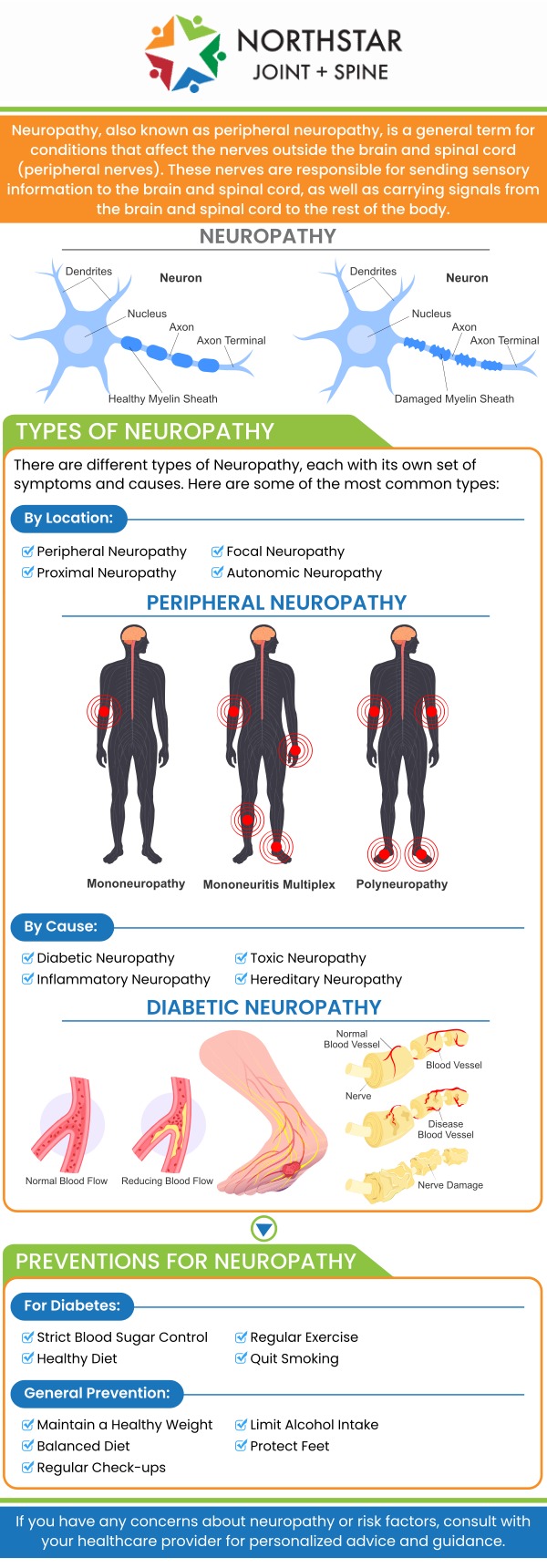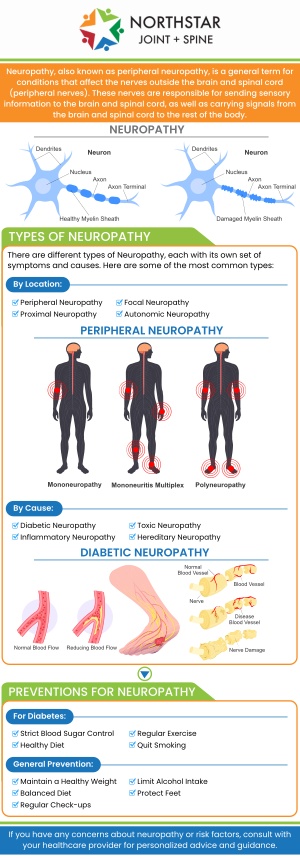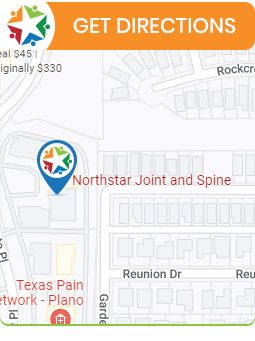What Causes Peripheral Neuropathy?
Peripheral neuropathy is a condition that affects the nerves outside the brain and spinal cord, leading to symptoms such as numbness, tingling, and pain in the hands and feet. The causes of peripheral neuropathy can vary, including diabetes, infections, autoimmune diseases, certain medications, vitamin deficiencies, and alcohol abuse. At Northstar Joint and Spine, Board-Certified Dr. Robert J. Nocerini specializes in diagnosing and managing peripheral neuropathy. He offers personalized care to help alleviate symptoms and improve quality of life. For more information, contact us today or schedule an appointment. We are conveniently located at 7704 San Jacinto Pl Suite #200 Plano, TX 75024.


Table of Contents:
What are the common symptoms of peripheral neuropathy?
How does peripheral neuropathy affect the body?
What are the causes of peripheral neuropathy?
Can peripheral neuropathy be prevented?
What other medical conditions contribute to peripheral neuropathy?
Peripheral Neuropathy Explained by Dr. Robert Nocerini at Northstar Joint and Spine in Plano, TX – Understanding Symptoms and Causes
At Northstar Joint and Spine, we understand the profound impact peripheral neuropathy can have on your daily life, and we’re committed to providing comprehensive care to address this condition.
Peripheral neuropathy occurs when the peripheral nerves, which connect the central nervous system to the rest of the body, become damaged. The symptoms can vary widely depending on the type of nerve affected—sensory, motor, or autonomic. Common symptoms include numbness or tingling, often in the hands and feet. This sensation can begin as a mild tingling or “pins and needles” feeling and progress to burning or sharp, stabbing pain, particularly at night.
In addition to sensory symptoms, peripheral neuropathy can affect motor function, leading to muscle weakness, poor coordination, and difficulty performing tasks that require fine motor skills. If you experience instability or frequent stumbling, it may be related to motor nerve involvement. Some individuals may also experience autonomic symptoms, such as changes in blood pressure, heart rate, digestive issues, or irregular sweating. These symptoms can be managed with a personalized treatment plan to improve quality of life. If you’re noticing any of these symptoms, it is important to seek professional care to properly address the condition and its impact on your daily life.
We recognize that the symptoms of peripheral neuropathy can vary widely, and our approach is personalized to meet the unique needs of each patient. By seeking medical evaluation and management with us, you can take proactive steps toward improving your quality of life and managing the symptoms of peripheral neuropathy effectively.
We understand the profound impact that peripheral neuropathy can have on your daily life. Dr. Robert J. Nocerini, MD is dedicated to diagnosing and managing this condition, which affects the peripheral nervous system—the extensive network of nerves outside the brain and spinal cord.
Peripheral neuropathy can significantly affect the body by damaging the peripheral nerves, which are responsible for transmitting signals between the central nervous system and the rest of the body. The condition can impact sensory, motor, and autonomic nerves, leading to a wide range of symptoms.
Sensory nerve damage often results in tingling, numbness, or burning sensations, particularly in the hands and feet. This can impair the body’s ability to accurately sense temperature and pain. Motor nerve damage can lead to muscle weakness, coordination issues, and difficulty with balance. This may make everyday tasks harder and increase the risk of falls. Additionally, autonomic nerve damage can disrupt bodily functions such as heart rate, digestion, and bladder control. It can also affect sweat production and temperature regulation. Managing these symptoms is key to improving daily comfort and maintaining a high quality of life. Targeted treatments can help alleviate these effects and restore function in affected areas of the body.
We understand that peripheral neuropathy can have a considerable impact on your quality of life, causing discomfort, sleep issues, and emotional turmoil. Our personalized care plans are designed to alleviate these challenges, fostering a sense of independence and improving overall well-being.
Our team recognizes the profound impact peripheral neuropathy can have on our patients’ quality of life. This condition occurs due to damage to the peripheral nerves, which are crucial for transmitting information between the central nervous system and the rest of the body. Our approach focuses on diagnosing and managing this complex condition, which often manifests as pain, tingling, numbness, and weakness, particularly in the hands and feet.
When the peripheral nerves, which are tasked with conveying signals between the brain, spinal cord, and the rest of the body, become damaged, peripheral neuropathy occurs. The condition can be caused by various factors, including diabetes, which is one of the most common causes. High blood sugar levels over time can damage the nerves, leading to symptoms such as numbness, tingling, or pain in the hands and feet. Other causes include infections, autoimmune diseases, and exposure to toxins such as heavy metals or certain medications.
In addition to diabetes, peripheral neuropathy can be associated with chronic inflammation or certain cancers, which can lead to nerve damage. In some cases, the exact cause of peripheral neuropathy is unknown, and the condition is referred to as idiopathic neuropathy. It’s important to address the underlying causes to help manage symptoms and prevent further nerve damage.
Our multidisciplinary team is dedicated to delivering holistic care for peripheral neuropathy. By understanding and addressing the diverse causes of this condition, we strive to improve our patients’ well-being and enhance their quality of life.
We understand the complexities and challenges associated with peripheral neuropathy, a condition that can significantly impact your quality of life. Our practice is dedicated to providing comprehensive care and personalized strategies to help manage and prevent peripheral neuropathy, particularly for those at higher risk.
While it may not always be possible to prevent peripheral neuropathy, several measures can help reduce the risk of developing the condition. For individuals with diabetes, maintaining proper blood sugar control is crucial in preventing nerve damage. Regular monitoring of blood sugar levels, following a healthy diet, staying active, and taking prescribed medications can significantly reduce the likelihood of neuropathy. For those with other underlying conditions, such as autoimmune diseases, managing the condition with the help of a healthcare provider can also reduce the risk of nerve damage.
In addition to controlling chronic conditions, avoiding lifestyle factors that contribute to nerve damage can help prevent peripheral neuropathy. For instance, limiting alcohol consumption and avoiding exposure to toxins, such as certain chemicals or medications, can be beneficial. Regular physical activity and proper nutrition, including adequate intake of vitamins, especially B vitamins, can help maintain nerve health. Wearing protective footwear and preventing harm are also important steps to take, especially for individuals with a higher risk of developing neuropathy.
Several medical conditions can contribute to the development of peripheral neuropathy, affecting the nerves outside the brain and spinal cord. At Northstar Joint and Spine, we specialize in diagnosing and managing these conditions to help alleviate symptoms and improve quality of life.
Chronic kidney disease is one of the leading contributors to peripheral neuropathy. When kidney function declines, waste products accumulate in the bloodstream, which can damage the peripheral nerves. Additionally, hypothyroidism, or an underactive thyroid, can lead to neuropathy by slowing down nerve function due to hormonal imbalances.
Certain cancers and their treatments, such as chemotherapy, can also cause peripheral neuropathy. Chemotherapy drugs are designed to target and kill cancer cells, but they can also damage healthy nerve cells, leading to tingling, numbness, and pain in the extremities. Other metabolic conditions, such as liver disease and vitamin deficiencies (especially B12), can disrupt nerve function and contribute to neuropathy.
Infectious diseases like Lyme disease, HIV, and shingles can directly damage nerves, leading to neuropathic symptoms. Autoimmune disorders, including rheumatoid arthritis and lupus, can also trigger the immune system to attack nerve tissues, resulting in peripheral neuropathy.
At Northstar Joint and Spine, Board-Certified Dr. Robert J. Nocerini provides comprehensive care for peripheral neuropathy, offering personalized treatment options based on the underlying cause of the condition.
Board-Certified Dr. Robert Nocerini, MD provides advanced diagnostic evaluations and personalized care for patients struggling with peripheral neuropathy. With over 26 years of experience in interventional pain management, Dr. Nocerini focuses on identifying the root causes of nerve dysfunction—whether metabolic, autoimmune, or structural—and creating precise, patient-specific treatment plans. His approach prioritizes restoring nerve function, reducing discomfort, and improving overall quality of life through evidence-based, minimally invasive therapies.
Dr. Nocerini’s Patient-Centered Approach
At Northstar Joint and Spine, Dr. Nocerini tailors every neuropathy treatment plan using the latest interventional techniques and diagnostic tools. His goal is to provide sustainable relief while enhancing function and nerve health. Plano patients trust Dr. Nocerini for his compassionate care, precision-based methods, and dedication to helping them regain comfort and mobility through individualized treatment strategies.
At Northstar Joint and Spine, your well-being is our priority, and we are here to support you every step of the way. Contact us today to schedule a consultation and start your journey toward pain relief. We are conveniently located at 7704 San Jacinto Pl, Suite #200, Plano, TX 75024. We serve patients from Plano TX, Willow Bend TX, Frisco TX, Allen TX, Addison TX, North Dallas TX, and surrounding areas.

Check Out Our 5 Star Reviews


Additional Services You May Need
▸ Back Pain
▸ Shoulder Pain
▸ Chronic Pain
▸ Epidural Steroid Injections
▸ Spinal Cord Stimulation
▸ Viscosupplementation
▸ Genicular Nerve Blocks
▸ Facet Injections
▸ Joint Injections
▸ Sacroiliac Joint Injections
▸ Lumbar and Cervical
▸ Facet Medial Branch Blocks
▸ Diagnostic Nerve Blocks
▸ Medication Management
▸ Neck Pain Doctor
▸ Diabetic Peripheral Neuropathy
▸ Headaches
▸ Suboxone
▸ Botox for Migraines
▸ Peripheral Nerve Stimulation
▸ Spine
▸ Joints
▸ Muscles
▸ Bones

Additional Services You May Need
▸ Back Pain
▸ Shoulder Pain
▸ Chronic Pain
▸ Epidural Steroid Injections
▸ Spinal Cord Stimulation
▸ Viscosupplementation
▸ Genicular Nerve Blocks
▸ Facet Injections
▸ Joint Injections
▸ Sacroiliac Joint Injections
▸ Lumbar and Cervical
▸ Facet Medial Branch Blocks
▸ Diagnostic Nerve Blocks
▸ Medication Management
▸ Neck Pain Doctor
▸ Diabetic Peripheral Neuropathy
▸ Headaches
▸ Suboxone
▸ Botox for Migraines
▸ Peripheral Nerve Stimulation
▸ Spine
▸ Joints
▸ Muscles
▸ Bones






